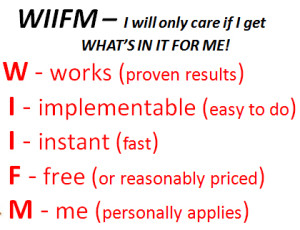 Good communication happens when you understand and apply a simple but prevailing point – everyone operates under the premise of “What’s in it for ME?” – We are basically selfish in our perspective because we exist inside our own world. We see reality as it is filtered through our own experience. And we think that our unique viewpoint is understood and recognized by everyone else.
Good communication happens when you understand and apply a simple but prevailing point – everyone operates under the premise of “What’s in it for ME?” – We are basically selfish in our perspective because we exist inside our own world. We see reality as it is filtered through our own experience. And we think that our unique viewpoint is understood and recognized by everyone else.When we are aware of this predisposition in every one, in virtually every situation, we can act accordingly with this knowledge, with gives insightful clarity to our communication.
“I like Jane’s haircut” is heard and then translated to, “I wonder if my haircut looks good…” WIIFM.
Or “Jane really looks good for her age” becomes “I’m close to Jane’s age – I wonder if she thinks I look too.” WIIFM.
“I’m really mad at John for not getting his work in on time, which held up the whole project” is heard and translated to, “I wonder if she’s insinuating that I could have been faster in delivering my work on the project.” WIIFM. Now some people may think, “Well I actually know that John had some stuff going on in his life lately that may have held his work up” but most will internalize it instead with, “I’m glad I didn’t hold up the project.” It’s just human nature to think this way; that’s how we’re wired.
So when you’re talking to someone, try to remember to think about the impact of your words from their point of view before your words tumble out. It just takes a split second to do so and can be a great kindness in furthering the cause of good communication.
Our speedy brains can all think so much faster than we can talk. And we tend to use that extra time to structure our next thoughts about what we’re going to say next, instead of thinking about how the other person will take what we’re about to say, from their point of view. We actually have plenty of time to do both, but we don’t tend to do the latter. Sadly, we aren’t always made aware when we offend with the former.
Mother (who has taken the time to cook a nice meal) to teenager: “Dinner in 5!”
Teenager (who is engrossed on his phone): “yeah okay” which translates to, “I can eat any old time and I don’t want to break from what I’m doing right now.”
Mother (who just wants to feel appreciated for her efforts): “If you don’t come to the table right now, I’m closing the kitchen and you can just starve for all I care!”
Teenager (who has heard this threat before): “I said I’m coming… don’t have a cow already!”
Whereas the conversation could have gone like this:
Mother: “Please wrap up what you’re doing and plan to be seated at the table in five minutes, so your favorite food doesn’t get cold.”
Teenager (‘your favorite’ – now wondering what food is being served): “yeah okay”
Mother (when teenager is still not at the table 5 minutes later): “I’m giving away/serving myself the best pieces, so don’t complain if there’s nothing good left when you get to the table.”
COMMUNICATION TAKEAWAY: Since people tend to personalize and internalize just about everything, a good habit to adopt is to take a few split seconds before every comment and think about the same words from the other person’s point of view. Make ‘what’s in it for me’ be something that they want to hear, that they value, that motivates them to want to continue a relationship with you. The best communicators know this and do it routinely.
QUESTION: Have you ever said something quickly without thinking and wished that you could take it back? How often have your words been misconstrued, interpreted with a meaning that you didn’t intend to deliver?
